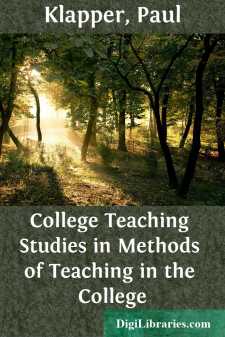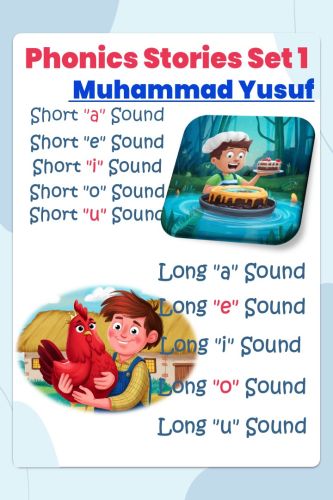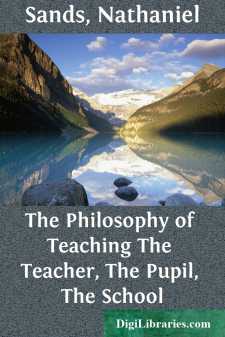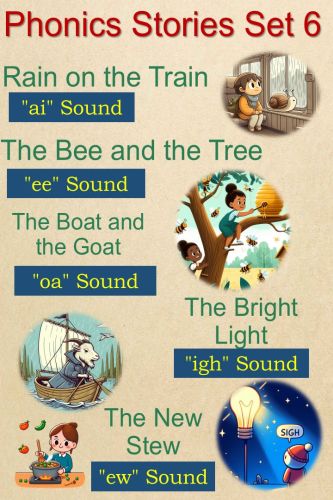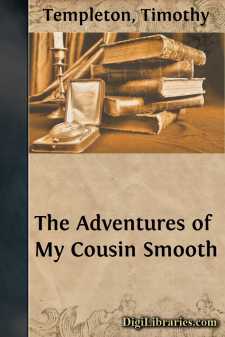Categories
- Antiques & Collectibles 13
- Architecture 36
- Art 48
- Bibles 22
- Biography & Autobiography 813
- Body, Mind & Spirit 142
- Business & Economics 28
- Children's Books 15
- Children's Fiction 12
- Computers 4
- Cooking 94
- Crafts & Hobbies 4
- Drama 346
- Education 46
- Family & Relationships 57
- Fiction 11828
- Games 19
- Gardening 17
- Health & Fitness 34
- History 1377
- House & Home 1
- Humor 147
- Juvenile Fiction 1873
- Juvenile Nonfiction 202
- Language Arts & Disciplines 88
- Law 16
- Literary Collections 686
- Literary Criticism 179
- Mathematics 13
- Medical 41
- Music 40
- Nature 179
- Non-Classifiable 1768
- Performing Arts 7
- Periodicals 1453
- Philosophy 64
- Photography 2
- Poetry 896
- Political Science 203
- Psychology 42
- Reference 154
- Religion 513
- Science 126
- Self-Help 84
- Social Science 81
- Sports & Recreation 34
- Study Aids 3
- Technology & Engineering 59
- Transportation 23
- Travel 463
- True Crime 29
College Teaching Studies in Methods of Teaching in the College
by: Paul Klapper
Categories:
Description:
Excerpt
PREFACE
The student of general problems of education or of elementary education finds an extensive literature of varying worth. In the last decade our secondary schools have undergone radical reorganization and have assumed new functions. A rich literature on every phase of the high school is rapidly developing to keep pace with the needs and the progress of secondary education. The literature on college education in general and college pedagogy in particular is surprisingly undeveloped. This dearth is not caused by the absence of problem, for indeed there is room for much improvement in the organization, the administration, and the pedagogy of the college. Investigators of these problems have been considerably discouraged by the facts they have gathered. This volume is conceived in the hope of stimulating an interest in the quality of college teaching and initiating a scientific study of college pedagogy. The field is almost virgin, and the need for constructive programs is acute. We therefore ask for our effort the indulgence that is usually accorded a pioneer.
In this age of specialization of study it is evident that no college teacher, however wide his experience and extensive his education, can speak with authority on the teaching of all the subjects in the college curriculum, or even of all the major ones. For this reason this volume is the product of a coöperating authorship. The editor devotes himself to the study of general methods of teaching that apply to almost all subjects and to most teaching situations. In addition, he coördinates the work of the other contributors. He realizes that there exists among college professors an active hostility to the study of pedagogy. The professors feel that one who knows his subject can teach it. The contributors have been purposely selected in order to dispel this hostility. They are, one and all, men of undisputed scholarship who have realized the need of a mode of presentation that will make their knowledge alive.
Books of multiple authorship often possess too wide a diversity of viewpoints. The reader comes away with no underlying thought and no controlling principles. To overcome this defect, so common in books of this type, a tentative outline was formulated, setting forth a desirable mode of treating, in the confines of one chapter, the teaching of any subject in the college curriculum. This outline was submitted to all contributors for critical analysis and constructive criticism. The original plan was later modified in accordance with the suggestions of the contributors. This final outline, which follows, was then sent to the contributors with the full understanding that each writer was free to make such modifications as his specialty demanded and his judgment dictated. This outline is followed in most of the chapters and gives the book that unifying element necessary in any book and vital in a work of so large a coöperating authorship.
The editor begs to acknowledge his indebtedness to the many contributors who have given generously of their time and their labor with no hope of compensation beyond the ultimate appreciation of those college teachers who are eager to learn from the experience of others so that they may the better serve their students....


